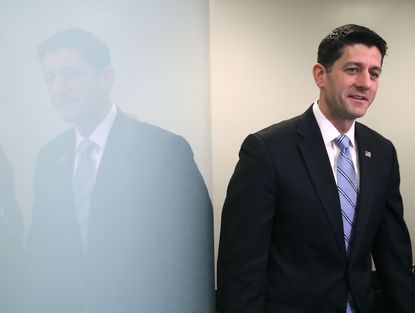Republicans can still fix health care. Here's how.
It's not over yet!


What now?
That's the question everyone's asking after the GOP's humiliating health-care debacle. The answer from the White House and the Republican leadership in Congress? "Tax cuts!"
This is not good enough. President Trump and the Republican leadership need to remember that the Republican Party just spent seven years loudly promising to "repeal and replace" ObamaCare. Walking away now represents what the Washington Examiner's Philip Klein accurately called "the biggest broken promise in political history." As he notes, it's frequent for a politician to try and fail to accomplish something he said he would do. It's different, however, when an entire party and movement puts a promise at the top of its agenda for seven whole years, through several electoral cycles, and then just throws its hands up and walks away after an initial failure.
Subscribe to The Week
Escape your echo chamber. Get the facts behind the news, plus analysis from multiple perspectives.

Sign up for The Week's Free Newsletters
From our morning news briefing to a weekly Good News Newsletter, get the best of The Week delivered directly to your inbox.
From our morning news briefing to a weekly Good News Newsletter, get the best of The Week delivered directly to your inbox.
Trump's notion that now Democrats "own" the unraveling of ObamaCare is a complete fantasy. Trump has an atavistic need to shift blame, but the buck really stops at his desk. He has bent or broken many political laws during his astonishing rise in politics, but the one that still stands is that voters blame the guy in the White House when bad things happen. This is doubly true when they actually have good reason to blame him, which is the case here.
As many observers have pointed out, passing ObamaCare took a long time. Obama held town halls and rallies, campaigned over and over again for the bill, and was deeply involved in the legislative process and the policy details. The Republicans have not done this on the American Health Care Act, not even close. But they must. Trump certainly enjoys a good rally, and surely there must be someone the White House can find who can handle the process and the policy.
Often, health-care reform in the United States seems impossible. Conservatives, moderates, and progressives want seemingly incompatible things, and so do the voters who decide elections. Most voters' goal seems to be to essentially have everything for free, and not pay for it either at point of sale (the more conservative option) or through taxes (the more progressive option). Any ObamaCare reform bill has to get votes from both the Tea Party Freedom Caucus to pass the House, and enough Democratic senators to break a filibuster (since using the reconciliation process prevents a full ObamaCare repeal). It seems impossible.
And yet... The GOP today is like a man standing on the edge of a burning oil platform. Jumping into the sea will almost certainly kill him. But not jumping will definitely kill him. As daunting as the jump is, he has to jump.
So where should the GOP go from here? From the AHCA fiasco, there is actually a glimmer of hope. The conventional wisdom is that the Freedom Caucus sunk the AHCA because it spent too much money, but National Review's Reihan Salam has reported that the Freedom Caucus was actually open to the idea of using tax credits or other spending to finance health-care coverage for people, but wanted more ObamaCare regulations and mandates repealed in exchange.
This leaves open an option that has been endorsed by luminaries such as The New York Times' Ross Douthat and (ahem) myself, which would accomplish enough of everyone's goals to have a glimmer of hope of passage, and be good policy. It would involve auto-enrolling everyone in catastrophic health-care plans, a sure political winner ("From now on, no one in America will have to lose their house because they have cancer !" Trump can repeat over and over on the stump), radically decentralizing Medicaid (a necessity), directly funding health savings accounts for the poor, generally increasing the use of health savings accounts and nudging people away from employer-funded health insurance towards portable solutions, and many market-based regulatory reforms. Such a package would accomplish progressive goals of universal coverage and conservative goals of decentralizing health care.
It would be good policy and good politics. And it's actually doable! But not if Republicans have already given up.
Create an account with the same email registered to your subscription to unlock access.
Sign up for Today's Best Articles in your inbox
A free daily email with the biggest news stories of the day – and the best features from TheWeek.com
Pascal-Emmanuel Gobry is a writer and fellow at the Ethics and Public Policy Center. His writing has appeared at Forbes, The Atlantic, First Things, Commentary Magazine, The Daily Beast, The Federalist, Quartz, and other places. He lives in Paris with his beloved wife and daughter.
-
 5 carefully selected cartoons about the Trump-Daniels jury selection process
5 carefully selected cartoons about the Trump-Daniels jury selection processCartoons Artists take on a stress-free life, rare peers, and more
By The Week US Published
-
 Loire Valley Lodges review: sleep, feast and revive in treetop luxury
Loire Valley Lodges review: sleep, feast and revive in treetop luxuryThe Week Recommends Forest hideaway offers chance to relax and reset in Michelin key-winning comfort
By Julia O'Driscoll, The Week UK Published
-
 Myanmar: the Spring Revolution and the downfall of the generals
Myanmar: the Spring Revolution and the downfall of the generalsTalking Point An armed protest movement has swept across the country since the elected government of Aung San Suu Kyi was overthrown in 2021
By The Week Staff Published
-
 Arizona court reinstates 1864 abortion ban
Arizona court reinstates 1864 abortion banSpeed Read The law makes all abortions illegal in the state except to save the mother's life
By Rafi Schwartz, The Week US Published
-
 Trump, billions richer, is selling Bibles
Trump, billions richer, is selling BiblesSpeed Read The former president is hawking a $60 "God Bless the USA Bible"
By Peter Weber, The Week US Published
-
 The debate about Biden's age and mental fitness
The debate about Biden's age and mental fitnessIn Depth Some critics argue Biden is too old to run again. Does the argument have merit?
By Grayson Quay Published
-
 How would a second Trump presidency affect Britain?
How would a second Trump presidency affect Britain?Today's Big Question Re-election of Republican frontrunner could threaten UK security, warns former head of secret service
By Harriet Marsden, The Week UK Published
-
 'Rwanda plan is less a deterrent and more a bluff'
'Rwanda plan is less a deterrent and more a bluff'Instant Opinion Opinion, comment and editorials of the day
By The Week UK Published
-
 Henry Kissinger dies aged 100: a complicated legacy?
Henry Kissinger dies aged 100: a complicated legacy?Talking Point Top US diplomat and Nobel Peace Prize winner remembered as both foreign policy genius and war criminal
By Harriet Marsden, The Week UK Last updated
-
 Trump’s rhetoric: a shift to 'straight-up Nazi talk'
Trump’s rhetoric: a shift to 'straight-up Nazi talk'Why everyone's talking about Would-be president's sinister language is backed by an incendiary policy agenda, say commentators
By The Week UK Published
-
 More covfefe: is the world ready for a second Donald Trump presidency?
More covfefe: is the world ready for a second Donald Trump presidency?Today's Big Question Republican's re-election would be a 'nightmare' scenario for Europe, Ukraine and the West
By Sorcha Bradley, The Week UK Published